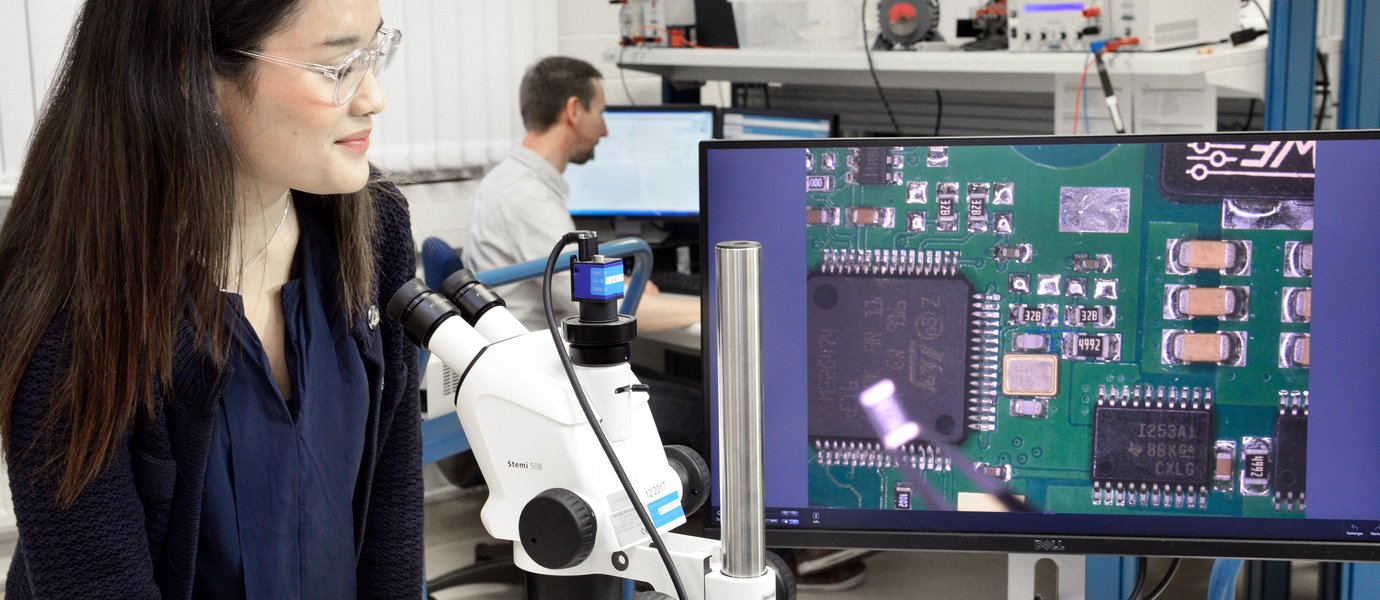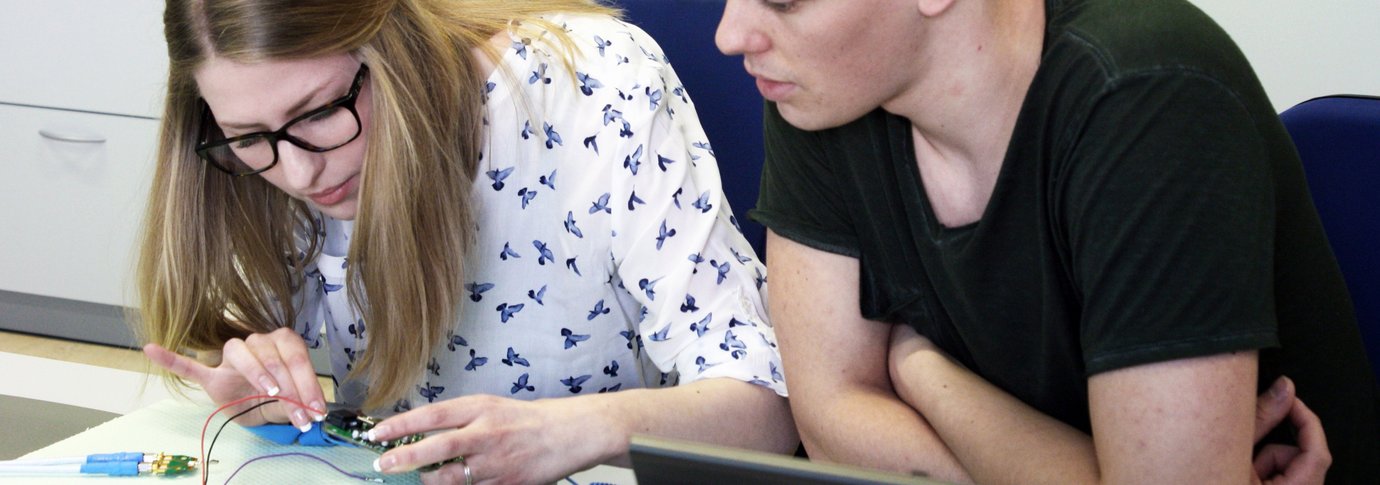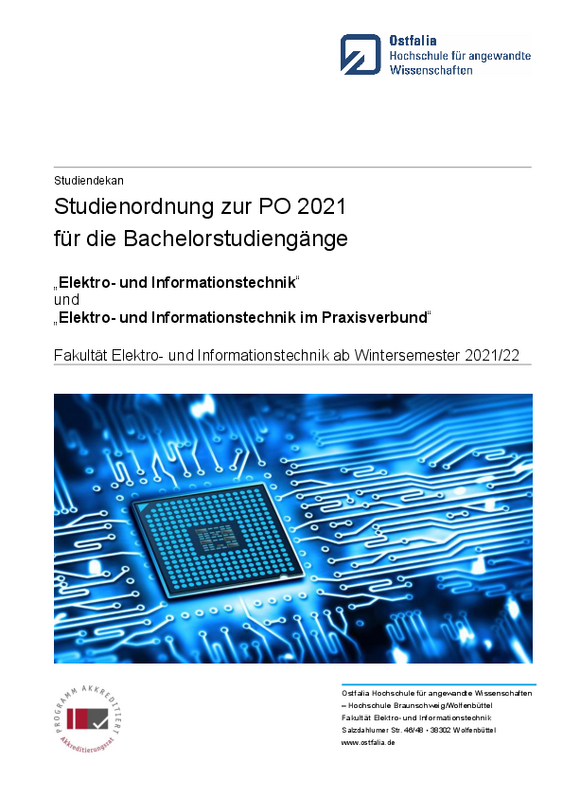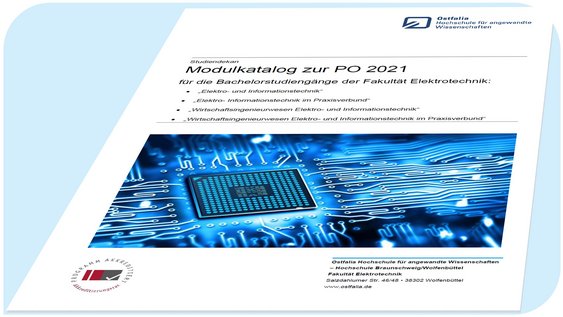Electrical Engineering and Information Technology
Innovative. Diverse. Future-proof.
Solar power plants in the desert, wind turbines in the sea, zero-emission electric vehicles... Today, everyone is surrounded by electrical engineering and electronics: at home in their smart home or on the move with their smartphone.
Imagine being part of the developments that are shaping our technological future, such as digital television, 5G technologies, Industry 4.0 or autonomous driving. With electrical engineering and information technology, you work at the forefront of technological innovations and advance topics such as renewable energies, artificial intelligence and medical technology.
Also discover our related degree programmes:
Electrical Engineering and Information Technology – Dual Programme – Bachelor's degree programme
Electrical Engineering, Business Administration and Economics – Bachelor's degree programme
Electrical Engineering, Business Administration and Economics – Dual Programme – Bachelor's degree programme
Facts at a glance
Apply now!
Secure your place at the Faculty of Electrical Engineering and Information Technology!
To the applicationDetails of the degree programme
Fields of activity
With your Bachelor of Engineering (B. Eng.) degree, you have excellent career and salary prospects. Your areas of work are diverse:
- Hardware and software development
- System and plant development
- Product development
- Research and development
- Project planning and management
- Technical sales
- Consultancy
- and much more.
in various industries, such as the
- Automotive industry and railway technology
- Aerospace
- Power generation and supply
- Information and communication technology
- Measurement and automation technology
- Medical technology
- Robotics
- Autonomous systems
Specialisations
In the main degree programme, you can choose between our four specialisations:
- Automation Technology
- Sustainable Energy Systems and Electromobility
- Information Technology
- Computer Engineering
Programme content
Field of study Automation Technology
- Industrial Automation
- Industrial Network
- Power Electronics
- Control Engineering
- Computer Architectures
Study programme Sustainable Energy Systems and Electromobility
- Electromobility
- Energy Transmission
- Smart Energy
- Power Electronics
- Control Engineering
Information Technology specialisation
- Digital Information Transmission
- Digital Signal Processing
- Radio Communication
- Network Technologies
- Computer Architectures
- Signal and System Theory
Computer Engineering specialisation
- Databases & Blockchain Technology
- Design of Digital Systems
- Embedded Toolchain
- Microcontroller
- Robotics & Actuators
Practical learning
Experience hands-on learning with us. You not only learn theory, but also apply it in real or realistic scenarios.
Direct application: Use laboratory experiments and simulations to experience and implement theories in practice.
Problem-orientated learning: Develop your problem-solving skills through exciting project work.
Insights into the professional world: Gain valuable experience through internships in cooperation with leading companies.
Develop key competences: Strengthen your problem-solving and decision-making skills as well as your communication and teamwork skills.
Market relevance: Prepare yourself optimally for your professional future by learning about the real-life challenges of your career today.
After the Bachelor
Study plan
1–3 semester Compulsory modules for basic studies (1. – 3. Semester) - Electrical Engineering
- Computer engineering
- Engineering Mathematics
- Digital Engineering
- Electrical measurement technology
- Electronic components and circuits
- Physics
Compulsory elective module (1. – 3. Semester) - Learning and working techniques
- Rhetoric and argumentation
- Technical foreign language
- Technical English 1
- Materials technology
Compulsory modules for basic studies (1. – 3. Semester) - Electrical Engineering
- Computer engineering
- Engineering Mathematics
- Digital Engineering
- Electrical measurement technology
- Electronic components and circuits
- Physics
- Electrical Engineering
- Computer engineering
- Engineering Mathematics
- Digital Engineering
- Electrical measurement technology
- Electronic components and circuits
- Physics
Compulsory elective module (1. – 3. Semester) - Learning and working techniques
- Rhetoric and argumentation
- Technical foreign language
- Technical English 1
- Materials technology
- Learning and working techniques
- Rhetoric and argumentation
- Technical foreign language
- Technical English 1
- Materials technology
Why study Electrical Engineering and Information Technology?
- 1
-
Diverse career opportunities
As a graduate in electrical engineering and information technology, doors are open to you in numerous sectors, be it the automotive industry, renewable energies, telecommunications or medical technology. Your skills are versatile and your career opportunities are diverse.
- 2
-
Innovation potential
Electrical engineering and information technology is at the centre of many technological innovations, from the development of new energy-efficient systems to advanced communication networks. This means you can play an active role in designing and improving modern technologies and help shape our technological future.
- 3
-
Global demand and future security
In a world that is becoming increasingly digital, electrical and information technology specialists are in high demand. This not only offers you a secure future, but also the opportunity to work internationally and manage exciting projects worldwide.
- 4
-
Interdisciplinary and solution-orientated
Your degree programme will introduce you to a wide range of disciplines. You will develop critical thinking and problem-solving skills that are valuable in almost all areas of life.
Useful links and files
Do you still have questions?
Our Central Student Advisory Service (ZSB) will be happy to support you.
Address
Building Am Exer 45, Room 101 -105
availability by phone:
Monday, Tuesday and Wednesday: 9:00 AM - 3:30 PM
Thursday: 1:00 PM - 3:30 PM
Friday and before holidays: 9:00 AM - 12:00 PM





